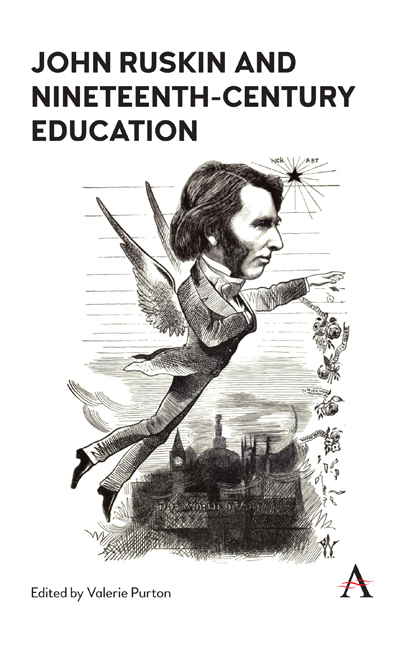Book contents
- Frontmatter
- Contents
- List of Figures
- Foreword
- Introduction
- Section A Changing the World
- Chapter 1 ‘An Enormous Difference between Knowledge and Education’: What Ruskin Can Teach Us
- Chapter 2 ‘Souls of Good Quality’: Ruskin, Tolstoy and Education
- Chapter 3 ‘To Teach Them How to Dress’: Ruskin, Clothing and Lessons in Society
- Chapter 4 Mad Governess or Wise Counsellor? Sesame and Lilies Revisited
- Section B Libraries and the Arts
- Section C Christianity and Apocalypse
- Notes on Contributors
- Index
Chapter 2 - ‘Souls of Good Quality’: Ruskin, Tolstoy and Education
from Section A - Changing the World
Published online by Cambridge University Press: 25 July 2018
- Frontmatter
- Contents
- List of Figures
- Foreword
- Introduction
- Section A Changing the World
- Chapter 1 ‘An Enormous Difference between Knowledge and Education’: What Ruskin Can Teach Us
- Chapter 2 ‘Souls of Good Quality’: Ruskin, Tolstoy and Education
- Chapter 3 ‘To Teach Them How to Dress’: Ruskin, Clothing and Lessons in Society
- Chapter 4 Mad Governess or Wise Counsellor? Sesame and Lilies Revisited
- Section B Libraries and the Arts
- Section C Christianity and Apocalypse
- Notes on Contributors
- Index
Summary
‘Education’, Ruskin wrote, is ‘leading human souls to what is best, and making what is best out of them’. For Tolstoy, who keenly admired Ruskin, it was ‘the development of a human soul, and […] making out of the younger generation the best men possible’. The similarities are obvious. For both of these literary giants of the nineteenth century, education was about the individual, and about the inner life. They sought not to make ‘a carpenter an artist’ – nor a peasant a landowner – ‘but to [make] him happier as a carpenter’ or as a peasant: nurturing ‘Souls’, in other words, ‘of a good quality’. What ‘makes men happiest in themselves’, Ruskin wrote, ‘also makes them most serviceable to others’. Education is key to the life of any healthy community. It should provide the glue that holds society together.
This chapter seeks to establish which of Ruskin's views on education Tolstoy most strongly endorsed. It explores the central elements of Tolstoy's educational research, ideals, classroom practices and publications in order to compare his approach to educational questions with Ruskin's. It is a study of affinity rather than influence, one that highlights significant reasons for Tolstoy's admiration of Ruskin and demonstrates how two uncompromisingly independent thinkers living in very different countries came to challenge educational orthodoxies in strikingly similar terms.
Ruskin and Tolstoy rejected nearly all the commonly stated purposes and widely accepted methodologies of the mainstream educationists of their day, and disregarded traditional classroom practices, embracing instead innovative and experimental approaches to teaching in the schools they planned or taught at. It is remarkable the extent to which they ploughed their own furrows, approaching matters that interested them – including education, though not limited to that subject alone – unencumbered by received opinion or orthodoxies. Neither rejected – still less, accepted – convention for the sake of it. They were fundamentalists in the truest sense: they sought to drill down to the roots of everything they studied.
Both Ruskin and Tolstoy devised plans for ideal schools in which competitive examinations would play no part. Both taught children – Tolstoy in his own schools on his estate at Yasnaya Polyana, and Ruskin at the girls’ school at Winnington Hall in Cheshire.
- Type
- Chapter
- Information
- John Ruskin and Nineteenth-Century Education , pp. 31 - 48Publisher: Anthem PressPrint publication year: 2018



